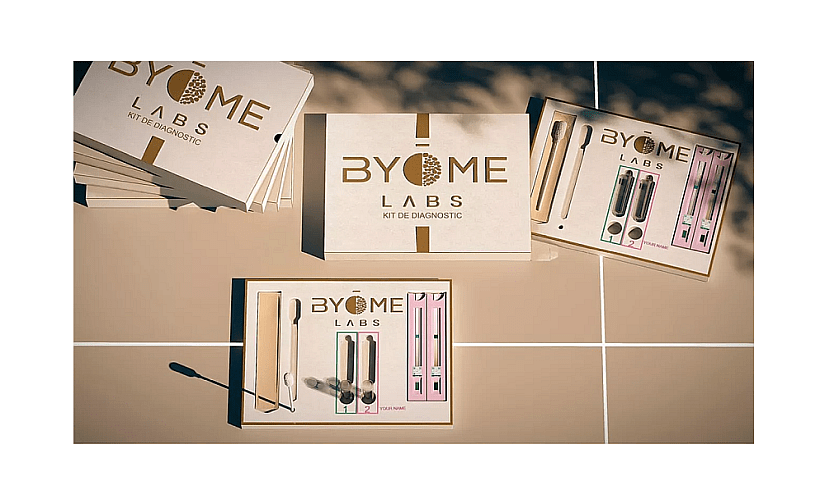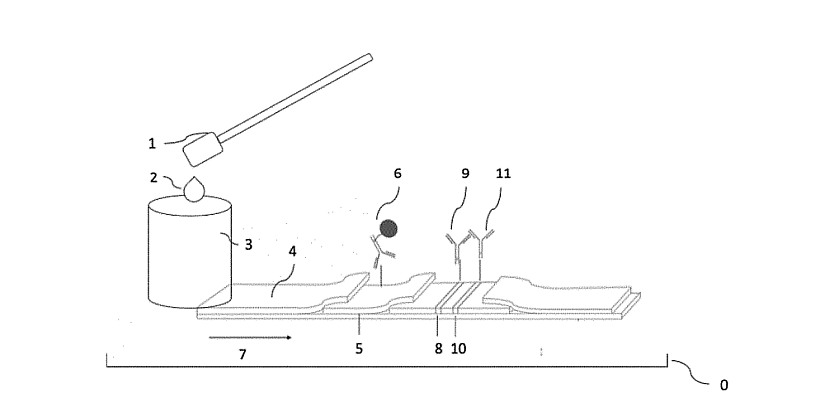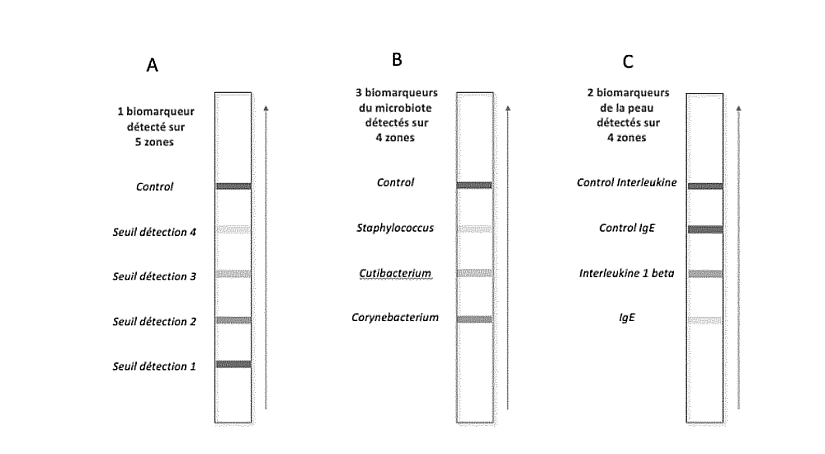SOPHIA ANTIPOLIS, France – October 08, 2025 │ French startup Byome Labs has successfully closed a seed funding round to accelerate the industrialization of Byome Derma, its fast and simple skin microbiome testing solution. KnowMade decodes the science behind the news.
About Byome Labs
Founded in 2023, Byome Labs is an innovative deeptech startup headquartered in France. The company operates a cutting-edge in vitro microbiology laboratory in Clermont-Ferrand, with 5000 microbiomes sequenced and over 200 cosmetic products tested and indexed. The company also runs an R&D center in the heart of Cosmetic Valley in Chartres, supported by a team composed of microbiologists, biochemists, data scientists, engineers and regulatory specialists, as well as administrative offices in Paris. Dedicated to the understanding of the microbiome and its applications for the cosmetics, dermocosmetics and pharmaceutical industries, Byome Labs has brought together a multidisciplinary team of experts to combine their knowledge about microbiology, immunology and artificial intelligence.
The company’s patent portfolio is composed of a single patent application so far, Byome Labs shows a desire for a broad coverage as observed with this WO application.
A new standard in personalized skincare
The Byome Derma solution
In 2024, the company created Byome Derma, a fast, simple and affordable skin test designed for point-of-sale use, providing tailored product recommendations based on each individual’s unique skin microbiome. Using antigen test strips (similar to Covid tests) (Figure 1), Byome Derma allows skin microbiome sampling and analyzes its microbial diversity within three minutes, directly at the point of sale. Immediately after, an AI platform, developed in collaboration with dermatologists, delivers personalized skincare recommendations without devices, pain or high cost. Designed for white-label integration, the device empowers cosmetic and dermocosmetic brands to enhance the customer journey with scientifically validated and hyper-personalized experiences.
The solution addresses both mass-market brands and premium beauty houses, and Byome Labs is already working in collaboration with several French and international brands specialized in targeted skincare.

Figure 1: Skin microbiome diagnostic kit from Byome Labs.
A will to expand skin microbiome technology for personalized skincare
Early September 2025, Byome Labs raised €3.6 million to commercialize Byome Derma, which is claimed to be the world’s first instant, point-of-sale skin microbiome measurement solution. Thanks to this funding, the company will scale up to industrial production of the kits by late 2025, drive international expansion across Europe, the United States and Asia in 2026 and expand its R&D team.
Byome Labs is not only focusing on technology but also stands out for its ethical approach: cruelty-free products, eco-design and French manufacturing. Its goal is to offer industrial players high precision in vitro analyses as well as marketing support to enhance the value of products certified as “microbiome friendly”.
The intellectual property aspect behind Byome Derma
The patent application WO2024/133284 describes a fast and reliable method for characterizing the skin-microbiota complex to enable personalized dermocosmetic recommendations based on the use of a device developed by Byome Labs. Unlike existing methods that study skin or microbiota separately, this invention considers both together as a symbiotic complex. It uses an immunochromatographic detection of multiple biomarkers simultaneously, either from the skin microbiota or the skin itself. For that purpose, the inventors have developed a device inspired by already existing diagnosis kits (like the ones used for COVID and pregnancy tests) but specified to the analysis of skin-microbiota interactions (Figure 2).

Figure 2: Schematic representation of the immunochromatographic revealing device designed for skin microbiome analysis. From WO2024/133284.
The device is composed of a transfer well (3) containing a sample solution in which a sampling device (1) is inserted, an absorbent zone (4) to apply the sampled solution, a zone with detection conjugate (5) with detection monoclonal antibody (6), a zone (8) on which a capture monoclonal antibody (9) has been deposited, a control zone (10) with an antibody directed against the conjugate (11), all of those are placed on top of a support (0). The direction of the migration flow is indicated by the arrow (7).
Biological material (including both skin cells and microbiota elements) is collected with a swab and dissolved in a solubilization buffer, which is a lysis and migration buffer typically used in immunochromatographic revelation methods. The suspension is then poured into the transfer well of the device and starts its migration through the strips of nitrocellulose paper. Across the migration flow, the liquid reaches revealing zones in which detection antibodies and capture antibodies are immobilized. These revealing zones include skin microbiota biomarkers and skin cell biomarkers (Figure 3). Among skin biomarkers, Interleukine 1 beta was selected as the most representative marker of inflammation in skin. Regarding skin microbiota biomarkers, surface proteins or secreted molecules characteristics of Staphylococcus, Cutibacterium and Corynebacterium genera were selected, such as biofilm-associated proteins (adhesins, pili, fimbriae), exopolysaccharides, secreted toxins or virulence factors (porphyrins, Pantome-Valentine leucocidin) and surface proteins (matrix-binding proteins, sialidases, chaperonins), even though the exact list of biomarkers selected in the device is not disclosed. Biomarkers are revealed as visible colored lines, and their intensity can be estimated upon semi-quantitative analysis based on multiple thresholds.

Figure 3: Representation of 3 different types of detection strips that can be used in the device. From WO2024/133284.
Strip (A) represents the detection of a single biomarker at multiple thresholds (1=103 cfu, 2=105 cfu, 3=107 cfu, 4=109 cfu for a microorganism; 1=1 ng, 2=10 ng, 3=100 ng, 4=1000 ng for a molecule). Strip (B) represents the detection of different microbiota biomarkers on different zones. Strip (C) represents the detection of skin biomarkers localized on different zones. On each strip, the control band corresponds to deposits of the biomarkers or antibodies and validates the migration of the detection conjugate. The intensity of the test bands depends on the quantity of each analyte having migrated, allowing a semi-quantitative analysis of the biomarkers.
After incubation (from 1 to 10 min), the test strips are photographed with a smartphone. The image is then analyzed by an AI system that processes the biomarkers profile to categorize the skin condition and microbiota balance through image analysis algorithms and supervised learning using a reference database of known biomarker patterns and dermatologists’ diagnoses. Once biomarkers are characterized, data are combined into a specific profile that is matched with a product database in order to recommend cosmetic products adapted to the skin type and compatible with its microbiota and suggest corrective care in case of microbiota imbalance.
According to the inventors, this invention offers a rapid, simple and low-cost solution that delivers results in a minute rather than days or weeks. It allows precise monitoring by repeating the test over time to follow skin response to cosmetic routines, to assess the effect of environmental factors, such as UV, pollution or stress, and to adjust skincare routines dynamically upon seasonal or age-related changes.
Filed in December 2023, this application is still pending in many countries. Regarding the procedure, after a first demand from the International Search Authority (ISA), Byome Labs has modified the first claim (a device for immunochromatographic revelation of the skin-microbiota complex comprising all the elements described above) to focus the invention on a method of personalized cosmetic recommendation based on the immunochromatographic characterization of various biomarkers of the skin microbiota complex. The ISA’s written opinion has concluded that claim 1 is novel, as no document in the prior art discloses exactly such a method. Indeed, the prior art closest to the subject, the patent application WO2020/161238 filed by FIBROTX OÜ, describes a device for immunochromatographic revelation of skin samples using a lateral flow technique, without detection of any biomarkers from the skin microbiota and the patent US20150148265 filed by Elwha, describes a method of cosmetic recommendation based on the immunochromatographic characterization of biomarkers from the skin microbiota without detection of biomarkers of skin cells. This method is also recognized as inventive, as the prior art neither describes nor suggests combining the detection of biomarkers of skin microbiota and biomarkers of skin cells in order to reach a personalized cosmetic recommendation.
As the timeline remains very early in the examination procedure, it is too soon to predict the future of protection of this patent application.
Conclusion
The innovation described in the patent application WO2024/133284 provides a rapid, low-cost, and comprehensive method for characterizing the skin-microbiota complex through immunochromatographic detection of specific biomarkers from both the skin and its microbiota. By simultaneously analyzing key bacterial genera (Staphylococcus, Cutibacterium, Corynebacterium) and skin biomarkers, the invention enables a combinatorial biological profile of the user’s skin state. This profile is then processed by artificial intelligence to deliver personalized cosmetic recommendations adapted to the skin type and microbiota balance, ensuring efficacy and microbiota compatibility. Filed late in 2023, this application is still pending internationally, and the International Search Authority has found the claims novel and inventive.
With this innovation, Byome Labs takes a step ahead on the exploration of skin microbiota applications. Byome Derma represents a milestone in personalized skincare through the scientific characterization of the interactions between skin and microbiota. By combining rapid in-store testing with advanced AI analysis, the solution deciphers each individual’s microbial profile to identify the specific needs of their skin. This biological insight enables truly personalized product recommendations, optimizing efficacy, tolerance and overall skin health. Byome Derma thus bridges the gap between microbiome science and everyday cosmetic routines, making precision skincare accessible to all. With the funding recently raised, Byome Labs will become a pioneer in instant skin-microbiome testing and AI-driven cosmetic recommendations.
Press contact
contact@knowmade.fr
Le Drakkar, 2405 route des Dolines, 06560 Valbonne Sophia Antipolis, France
www.knowmade.com
About the author
Céline Gaudel, PhD., works at KnowMade in the field of Biotechnology and Life Science. She holds a PhD in Molecular and Cellular Biology from the University of Nice Sophia-Antipolis (France). She previously worked in academic research in France and Ireland and has a background in skin science and cosmetic ingredients.
About KnowMade
KnowMade is a technology intelligence and IP strategy firm specializing in the analysis of patents and scientific publications. We assist innovative companies, investors, and research organizations in understanding the competitive landscape, anticipating technological trends, identifying opportunities and risks, improving their R&D, and shaping effective IP strategies.
KnowMade’s analysts combine their strong technology expertise and in-depth knowledge of patents with powerful analytics tools and methodologies to transform patent and scientific data into actionable insights to support decision-making in R&D, innovation, investment, and intellectual property.
KnowMade has solid expertise in Semiconductors and Packaging, Power Electronics, Batteries and Energy Management, RF and Wireless Communications, Photonics, MEMS, Sensing and Imaging, Medical Devices, Biotechnology, Pharmaceuticals, and Agri-Food.
